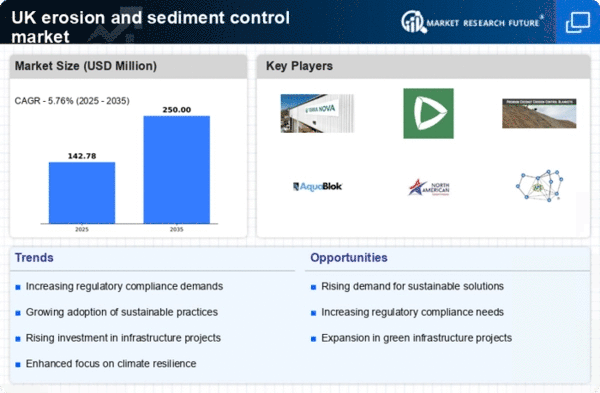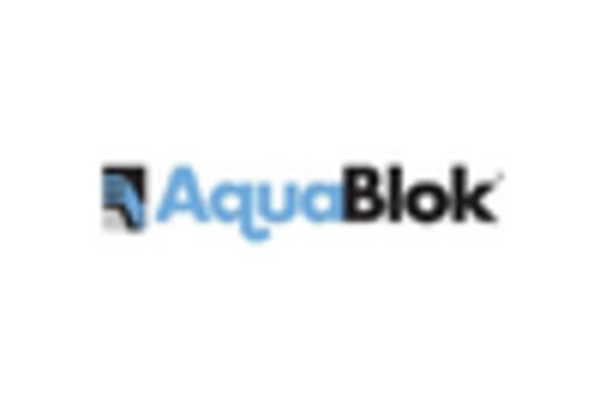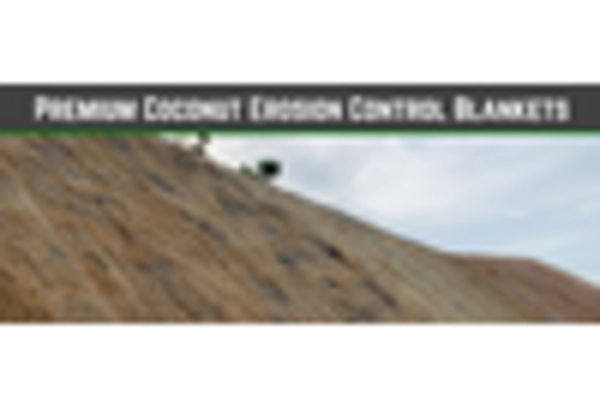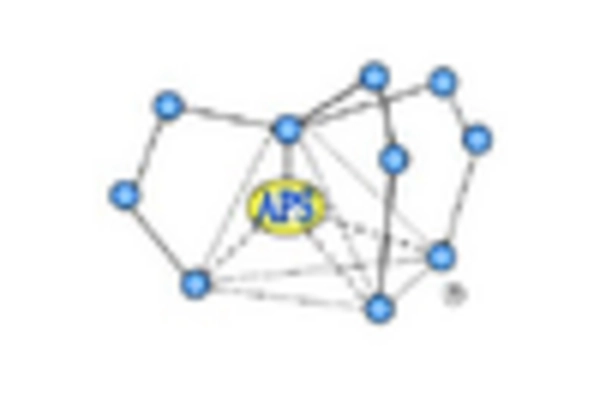Climate Change Mitigation Efforts
The erosion and-sediment-control market is increasingly influenced by climate change mitigation efforts, as the UK government prioritizes strategies to combat environmental degradation. Initiatives aimed at reducing carbon footprints and enhancing ecosystem resilience are driving the demand for effective erosion control solutions. For instance, the UK has set ambitious targets to achieve net-zero emissions by 2050, which necessitates the implementation of sustainable land management practices. This focus on climate resilience is likely to create new opportunities for the erosion and-sediment-control market, as stakeholders seek to adopt practices that minimize soil erosion and sediment runoff. As awareness of climate change impacts grows, the market is expected to expand, driven by the need for innovative solutions that address both erosion control and environmental sustainability.
Increased Environmental Awareness
The erosion and sediment control market is experiencing a notable surge due to heightened environmental awareness among the public and businesses. As climate change and its impacts become more pronounced, stakeholders are increasingly recognizing the importance of sustainable land management practices. This shift in perception is driving demand for effective erosion and sediment control solutions. In the UK, the government has reported a 30% increase in funding for environmental protection initiatives, which directly benefits the erosion and-sediment-control market. Furthermore, educational campaigns aimed at promoting soil conservation are likely to enhance public understanding of erosion issues, thereby fostering a more proactive approach to sediment control. This growing consciousness about environmental stewardship is expected to sustain market growth in the coming years.
Regulatory Compliance and Standards
The erosion and-sediment-control market is shaped by stringent regulatory compliance and standards set by the UK government. Recent legislation has mandated that construction and land development projects adhere to specific erosion control measures to protect water quality and prevent soil degradation. This regulatory landscape is compelling companies to invest in advanced erosion control technologies and practices. For instance, the Environment Agency has established guidelines that require developers to implement sediment control plans, which has led to a 25% increase in demand for erosion control products. As regulations continue to evolve, the erosion and-sediment-control market is likely to expand, driven by the need for compliance and the adoption of best practices in environmental management.
Investment in Infrastructure Development
The erosion and sediment control market is significantly influenced by ongoing investments in infrastructure development across the UK. With the government committing £600 billion to infrastructure projects over the next decade, there is a pressing need for effective erosion and sediment control measures to mitigate the environmental impact of construction activities. This investment is likely to create substantial opportunities for market players, as construction sites are often prone to erosion, necessitating the implementation of robust control measures. Additionally, the integration of erosion control practices in urban planning is becoming increasingly common, as municipalities seek to comply with environmental regulations. Consequently, the demand for innovative erosion and-sediment-control solutions is expected to rise, further propelling market growth.
Technological Advancements in Erosion Control
The erosion and-sediment-control market is benefiting from rapid technological advancements that enhance the effectiveness of erosion control measures. Innovations such as geotextiles, biodegradable erosion control blankets, and advanced sediment filtration systems are gaining traction among industry professionals. These technologies not only improve the efficiency of erosion control but also align with the growing demand for sustainable solutions. In the UK, the adoption of these advanced technologies is projected to increase by 40% over the next five years, as companies seek to optimize their erosion control strategies. Furthermore, the integration of data analytics and monitoring systems is enabling real-time assessment of erosion risks, thereby facilitating timely interventions. This technological evolution is likely to play a crucial role in shaping the future of the erosion and-sediment-control market.
















